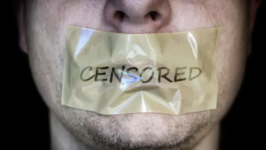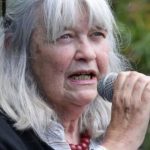Free Speech versus Censorship: Where Should the Line be Drawn?

At the beginning of this year, a small independent magazine was pulled from bookstore and news agency shelves in New Zealand over claims it had published sensitive information about the Christchurch Mosque massacre in 2019.
The accusation, which appeared in STUFF magazine, quoted Kate Hannah, the head of New Zealand’s Disinformation Project, saying that an article by Dr TJ Coles “describes the content of live streamed video of the Christchurch shootings, as well [as] where it had been published, which could encourage people to seek it out.”
Ms Hannah further asserted that “readers should not take such magazines too lightly…People who see and/or consume such content must understand that there are larger and more dark agendas present.”
Watching and distributing the video of the Christchurch Massacre is illegal in New Zealand, under laws made by Jacinda Ardern’s government after it declared the terrorist’s name would not be published so as to prevent him from obtaining the notoriety he so craved.
Many agreed with the decision at the time. The Christchurch massacre was a horrendous act of terrorism by any measure – with 51 men, women and children mercilessly slain at and outside a Mosque by a right-wing extremist for no other reason than their religious beliefs.
Tension between free speech and censorship
However, the prohibition also triggered debate about where the line is to be drawn between free speech and censorship, and the potentially slippery slope of incrementally allowing governments to chip away at public debate – slowly ‘boiling the frog’ to the point where we awake one day to find public debate is unjustifiably limited.
The situation even has the potential to distort history.
Destroying the undesired
But back to New Dawn Magazine. Despite Ms Hannah being completely incorrect about the article – which did not encourage readers to view the video stream, nor did it include a link to a live stream footage – her comments set off a chain of events that has seen New Dawn magazine vilified – with significant damage to its credibility and commercial viability.
A good question to ask is why journalists didn’t do their own ‘fact checking’ prior to publishing Ms Hannah’s claims.
It’s easy to argue that in the 24/7 news cycle, tight deadlines don’t always permit thorough research. But it’s also the relentlessness of the 24/7 news cycle that means information – and equally misinformation or disinformation – can go viral in a matter of moments and then the damage is done.
As the comments made by Ms Hannah gained momentum in the New Zealand media, the publication was pulled from shelves, and now, incredulously, is left to defend itself and restore its reputation.
New Dawn is not a popular mainstream magazine, but it has, for more than two decades, published thought-provoking pieces, encouraging its readers to be open to different points of view. It has been referred to as a ‘conspiracy’ magazine, but it has a significant and steady global readership – and this is the first time in more than 20 years that it has attracted this kind of controversy.
A dangerous precedent
Undeniably, the circumstances which have seen New Dawn magazine banished from shelves sets a dangerous precedent, particularly given that New Dawn’s fate was sealed on a single, unsubstantiated, incorrect claim, made by one person.
And this should be an issue of concern for all Australians, particularly in light of the fact that our own media regulator is set to get expanded powers to crack down on ‘misinformation’.
Last month it was announced by the Federal Government that The Australian Communications and Media Authority (Acma) would be able to enact an enforceable industry code against online misinformation if industry self-regulation measures prove insufficient.
Currently, online platforms and social media companies are expected to ‘police themselves’ to a degree and the Online Safety Act 2021 outlines severe penalties for failing to do so when it comes to abhorrent, threatening or abusive content.
In addition, Acma is being given new information-gathering powers to ‘assess’ how platforms – including social media companies – respond to misinformation and disinformation.
Communications Minister Michelle Rowland says that “Misinformation and disinformation pose a threat to the safety and wellbeing of Australians, as well as to our democracy, society and economy.”
But over-regulation presents a serious problem too – because currently it’s not entirely clear what constitutes the definition of ‘misinformation’ and ‘disinformation’ and where we are placing the threshold for evidence, or who bears the responsibility for onus of proof.
What do we mean by ‘disinformation’ and ‘misinformation’?
Important questions need to be asked about safeguards for freedom of speech, as well as freedom of the press, too.
If we are determining that something is ‘misinformation’ or disinformation’ simply because it argues against a popular, majority-driven narrative, or presents a divergent, perhaps contrary point of view, then we might as well say RIP to democracy.
Because, in a democracy, we are each entitled to make personal choices, and to form our own opinions. Without access to a wide range of corresponding and contrasting research, ideas, statistics, wisdom, opinion and knowledge it is not possible for any of us to do that in a truly informed way.
And yes, that means we will be highly likely to come across fake news from time to time and need to exercise discernment about such content in line with our own beliefs and ideologies.
We must also remember that debate and challenging popular ideas and constructs is also the cornerstone of a healthy, functioning democracy. It must be encouraged, rather than labelled as something dangerous and ‘untrustworthy.’







